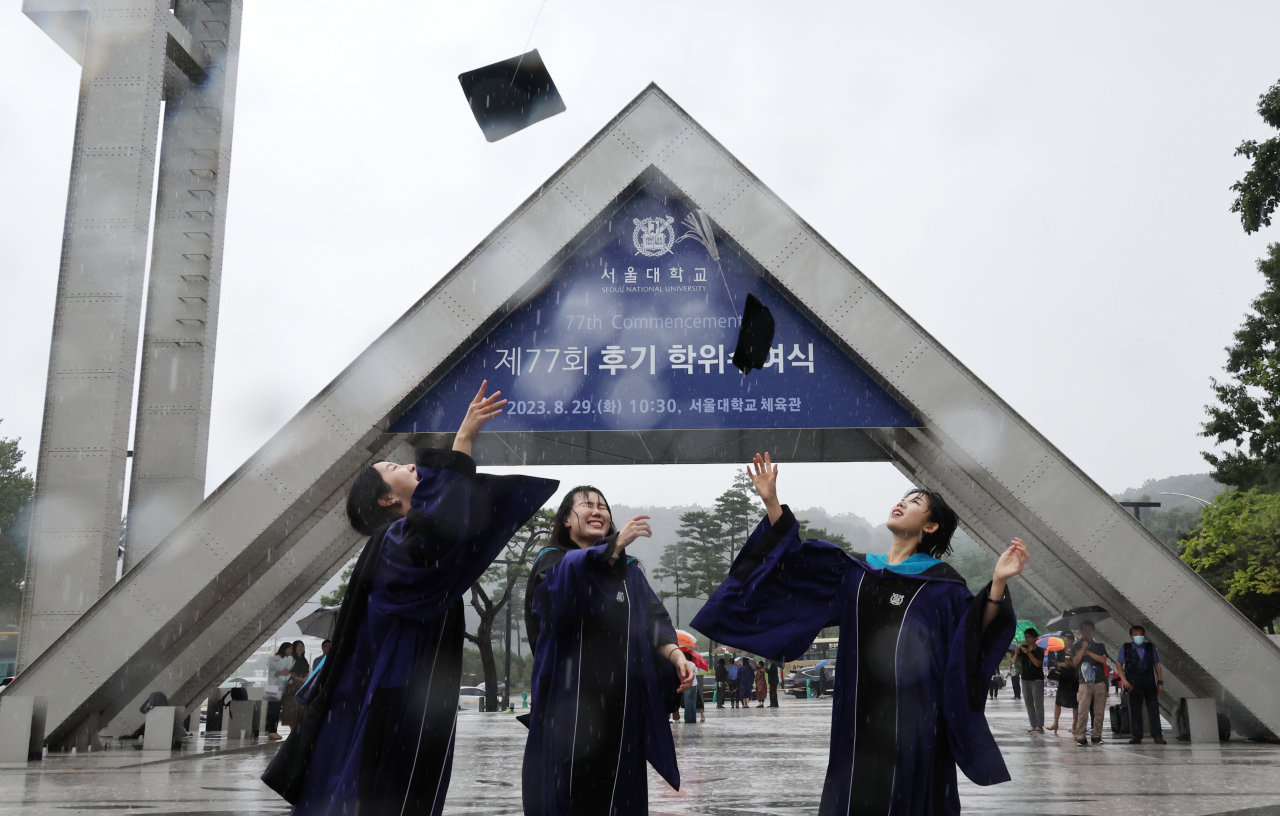[KH explains] Chipmakers reach out to undergraduates to tackle talent shortage
Samsung, SK setting up job-guaranteed courses at elite schools to lure top talent
By Jo He-rimPublished : Aug. 30, 2023 - 17:09

Chipmakers around the world are competing fiercely not just to roll out more advanced chips faster than their rivals, but also to secure more tech talent as governments race to build up their chip industry as national security assets.
South Korea, home to the world’s top two memory chipmakers, Samsung Electronics and SK hynix, is no exception. Amid their big push for global expansion, the tech giants are struggling to meet staffing needs for their billion-dollar facilities at home and abroad.
After years of holding global job fairs and offering hefty incentives, Korean chipmakers, together with the government, are now pushing further by setting up new specialized departments at elite schools whose graduates are guaranteed to be accepted by the nation’s most coveted chaebol groups.
Chronic labor shortage
According to estimates by the Korea Semiconductor Industry Association, there were 179,000 workers in the chip industry as of 2022. The association predicts that in order for the nation to secure a competitive edge, it needs to almost double the workforce by adding some 125,000 more jobs by 2030.
In line with the projection, the government has also set the goal of nurturing 150,000 qualified workers by 2032, with a total of 12 universities across the nation being designated as schools specialized in semiconductor engineering.
These schools, which include Seoul National University and other national universities representing different provinces, were either newly established or adjusted their existing curriculums to better meet the industrial needs.
The Education Ministry, in particular, has vowed to spend 50 billion won ($38 million) to support the departments over the next four years.
Chipmakers have also joined hands with the country's top universities to establish "contract departments" where they provide financial support and promise the graduates a job in their companies.
Samsung Electronics has built contract departments with seven universities: Sungkyunkwan University, Yonsei University, Korea Advanced Institute of Science and Technology, Ulsan National Institute of Science & Technology, Pohang University of Science and Technology, Gwangju Institute of Science and Technology and Daegu Gyeongbuk Institute of Science and Technology.
SK hynix has partnered with three schools, including Korea University, Hanyang University and Sogang University.
These departments offer students a wide range of basic engineering courses in their junior years from electric circuits to robots to flexible electronic materials. In the latter years, they are trained in advanced engineering such as semiconductor integration engineering capstone design.
Top 1% talent
Earlier this year, the fact that the initial 47 students accepted by the contract departments at four schools -- Korea University, Yonsei University, Hanyang University and Sogang University -- gave up their placement offers at the last minute to choose to go to medical schools instead made local headlines. Even though the schools' capacity was eventually filled with runner-ups, concerns were raised about the efficacy of such departments in easing a labor shortage in the chip industry.
But industry officials dismissed the skepticism, saying what’s important is that top students who qualify for medical schools are applying to study chips.
“During the enrollment period, some expressed worries that the industry is losing talent to med schools. But when you reverse that idea, it also means that those students who can go to med schools are applying for chip departments," an industry official said on condition of anonymity.
Over concerns that the departments are not enough to train the students as chip specialists who can be put to work right away, industry insiders say the ultimate goal should be attracting talented students to the field at an early stage of their careers.
“We hope to hire employees who know about semiconductors, of course. But it’s difficult. Even students who majored in semiconductor engineering should be trained from the beginning when they enter the company,” said another industry official who did not wish to be named.
“Still, I believe the reason why chipmakers are setting up contract departments is to secure the nation’s top students in advance, before they enter other fields.”
In Korea, where birth rates are the world's lowest, the student population is on a steady decline. The number of students in kindergartens as well as elementary, middle and high schools recorded 5.88 million in 2022, down by 1.3 percent from a year ago.
Teaching shortage
While strengthening education on semiconductor engineering is deemed one of the reasonable options to take for now, some point out that the government and companies are overlooking the shortage of professors who can train students to become chip specialists.
"I take on an abnormal number of about 80 master's and doctorate students under my supervision. Among the 330 engineering professors at Seoul National University, only about 10 are experts in chip," said Hwang Cheol-seong, chair professor of materials science and engineering at Seoul National University.
“Even though new contract departments are increasingly being set up, they don’t hire teachers for them. The schools just assign more classes to existing engineering professors. How do you expect quality education from this situation?”
According to industry estimates, there are about 650 semiconductor engineering graduates, among them only 150 are master’s or doctorate level.
Experts advise that more doctorate students should be nurtured as they are also trained to teach junior students.
"There are about 500 research professors majoring in chips, but more than half of them give up their research (because they lack the funds)," said Kim Sung-jae, a computer engineering professor who is also the head of the Inter-University Semiconductor Research Center.
"It is important to create a virtuous cycle of expanding research funds to nurture both master's and Ph.D. researchers, who would also teach undergraduates."











![[Kim So-hyun] The quiet taxi driver from Paris](http://res.heraldm.com/phpwas/restmb_idxmake.php?idx=644&simg=/content/image/2024/04/25/20240425050891_0.jpg&u=)







